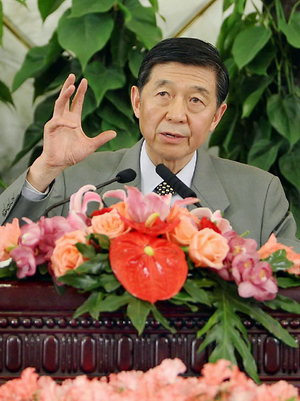
The Chinese People's Political Consultative Conference
spokesman, Wu Jianmin, speaks at a press conference in Beijing yesterday.-
Xinhua
THE First Session of the 11th National Committee of the Chinese People's
Political Consultative Conference (CPPCC), the country's top political advisory
body, opens this afternoon.
The session is scheduled to end on the
morning of March 14, Wu Jianmin, spokesman for the session, told a press
conference yesterday.
Jia Qinglin, chairman of the 10th CPPCC National
Committee, will deliver a report on the work of the CPPCC National Committee's
Standing Committee over the past year, while Zhang Meiying, vice chairperson of
the 10th CPPCC National Committee, will report how the suggestions and proposals
from CPPCC members were handled since the last session, Wu said.
More
than 2,000 CPPCC members are expected to discuss the report on government work
delivered by Premier Wen Jiabao, a plan on restructuring central departments
under the State Council, and reports on the work of the Supreme People's Court
and Supreme People's Procuratorate.
They will also elect a chairperson,
vice chairpersons and secretary-general of the 11th CPPCC National Committee,
and also members of the Standing Committee of the 11th CPPCC National
Committee.
In addition, political advisers will adopt a political
resolution, several other resolutions and reports at the annual session.
Wu said that more eligible non-Communists are expected to become
high-ranking officials in China following last year's appointments of two
non-Communist ministers. "Many non-Communist personages have taken up posts at
government departments and judicial bodies since China started its reform and
opening up toward the late 1970s," he said.
Wan Gang, of the China Zhi
Gong Dang (Party for Public Interest), was appointed Minister of Science and
Technology last April, and Chen Zhu, non-party member, became Minister of
Health.
Their appointments represented "major moves" by the Communist
Party of China (CPC) in enhancing socialist democracy and pushing forward
multi-party cooperation and political consultation under the leadership of the
CPC, Wu said. "Across China, more than 31,000 non-Communists are working as
officials at and above county level, of whom at least 6,000 work at government
organizations and judicial bodies at various levels," he said.
China's 31
provinces, municipalities and autonomous regions have in total 30 non-Communist
vice governors.



